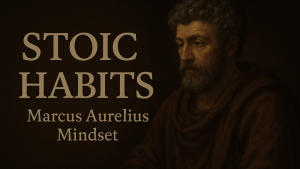In times of adversity and hardship, finding solace and guidance from the ancient philosophy of Stoicism can be immensely valuable. Epictetus, a prominent Stoic philosopher of ancient Greece, offers timeless advice for hard times that continues to resonate with individuals navigating challenging circumstances. Epictetus emphasized the power of the human mind and the importance of mastering one’s emotions to cultivate inner strength and resilience. Let us explore the advice that Epictetus would have for us during difficult times.
Epictetus’ Stoic Wisdom: Timeless Advice for Hard Times
- Acceptance of What is Beyond Our Control:
Epictetus emphasized the concept of distinguishing between things within our control and those outside of it. He believed that our response to external events is where our power lies. During hard times, Epictetus would advise us to focus on accepting the things we cannot change. By embracing the reality of our circumstances rather than resisting them, we free ourselves from unnecessary suffering and redirect our energy towards productive actions.
- Cultivating Inner Virtue:
For Epictetus, true happiness and strength were found in the development of one’s character and virtue. During challenging times, he would encourage us to focus on cultivating qualities such as courage, resilience, and wisdom. Instead of dwelling on external circumstances, Epictetus would remind us to nurture our inner virtues, as they are not subject to the whims of fate. By aligning our actions with our core values, we gain a sense of purpose and fulfillment even in the face of adversity.
- Practicing Mindfulness and Self-Reflection:
Epictetus believed that self-awareness and introspection were vital for personal growth and emotional well-being. During hard times, he would advocate for the practice of mindfulness – observing our thoughts, emotions, and reactions without judgment. By developing a heightened awareness of our own inner dialogue, we can identify and challenge negative or unhelpful thought patterns. This process allows us to reframe our perspective, find gratitude in the present moment, and maintain a calm and rational mindset in the midst of challenges.
- The Power of Stoic Resilience:
Stoicism places great emphasis on building resilience in the face of adversity. Epictetus would remind us that difficulties are an inevitable part of life, and it is our response to them that matters most. He would encourage us to view hardships as opportunities for growth and learning, rather than as insurmountable obstacles. By embracing challenges with a stoic mindset, we develop the mental fortitude to navigate difficulties with grace and equanimity.
- Embracing Impermanence:
Epictetus recognized the impermanence of all things and emphasized the importance of not becoming too attached to external outcomes. In times of hardship, he would counsel us to acknowledge that adversity, like all things, is temporary. By understanding that difficult times will eventually pass, we can find solace and strength in the knowledge that we have the resilience to endure and thrive in the face of adversity.
Epictetus’ Stoic philosophy provides us with invaluable guidance for navigating hard times. By accepting what is beyond our control, cultivating inner virtue, practicing mindfulness, embracing resilience, and embracing the impermanence of challenges, we can find profound strength and wisdom. Epictetus reminds us that despite the hardships we may encounter, we have the power to shape our responses and maintain a sense of tranquility and peace within ourselves. As we draw from his timeless teachings, we can cultivate a stoic mindset that allows us to face difficult times with unwavering resolve and a steadfast spirit.







